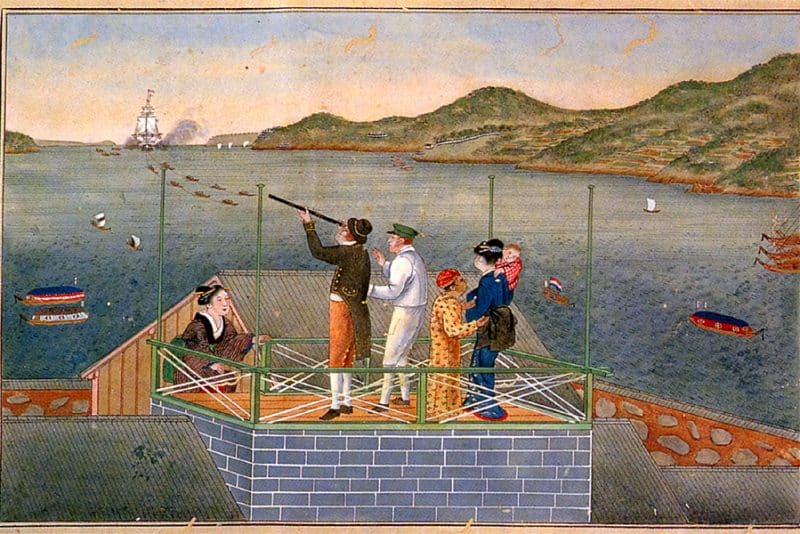
East Asian Legacies of Colonialism and Imperialism
This series of eight standalone online workshops will consider the legacies of colonialism and imperialism within an East Asian context. Designed for secondary teachers in Social Studies, History, Art History, Art, Language Arts, English, and Visual Culture, each workshop will address different aspects of the historical legacy and present-day realities of imperialism and colonialism. Elementary educators are welcome and encouraged to join as content is relevant. All workshops will be led by art historian Melanie King and historian Tracy Lai.
Image: Painting by Kawahara Keiga depicting Europeans in Dejima, the Dutch trading colony in the harbor of Nagasaki (early 19th century)
Participants will choose to attend at least one of the following sessions:
Session 1: Tea, opium, and goods on ships
Monday, July 10 - 10:00 AM to 12:00 PM (PST)
Join Tracy and Melanie for the first session in this series that will consider the role of tea, opium, and other goods as objects and legacies of the imperial project.
Session 2: On display in exhibitions and competitions
Monday, July 10 - 1:00 PM to 3:00 PM (PST)
In this session, we’ll consider exhibitions as part of World’s Fairs and recent Olympics. In these different contexts how has East Asia presented itself and how have the different countries been received? And how have these efforts been perceived around the world?
Session 3: Asian Diasporas and Economics
Tuesday, July 11 - 10:00 AM to 12:00 PM (PST)
In this session we will consider the economics of immigration policies and how this has shaped Asian communities in the U.S. What is the role of foreign factories and Asian migrant workers in the global manufacturing and supply chain?
Session 4: Militarization and occupations
Tuesday, July 11 - 1:00 PM to 3:00 PM (PST)
In this session we will consider multiple legacies of militarization by empires and the continued tension between China, Japan, Korea, Taiwan and the U.S. in the region.
Session 5: Museum collections and appropriations
Wednesday, July 12 - 10:00 AM to 12:00 PM (PST)
This session will examine the legacy of plundered sites, the assemblage of objects in museums outside of the region, and the politics of appropriation.
Session 6: Reclaiming lost histories: Issues of repatriation and restitution
Wednesday, July 12 - 1:00 PM to 3:00 PM (PST)
In this session we will discuss examples of restitution and their significance. We will also discuss contemporary artists taking up these issues in their art.
Session 7: The New Silk Roads
Thursday, July 13 - 10:00 AM to 12:00 PM (PST)
In this session we will consider the multi-faceted exchanges and new concentrations of power along the new silk roads. Topics to be considered include China’s Belt & Road Initiative and the future of globalization.
Session 8: Asia’s Worldwide Influence
Thursday, July 13 - 1:00 PM to 3:00 PM (PST)
Our final session in this series will look at the myriad of ways cultural exports appear and influence our lives. Topics to be considered include music, food, media, and entertainment.
